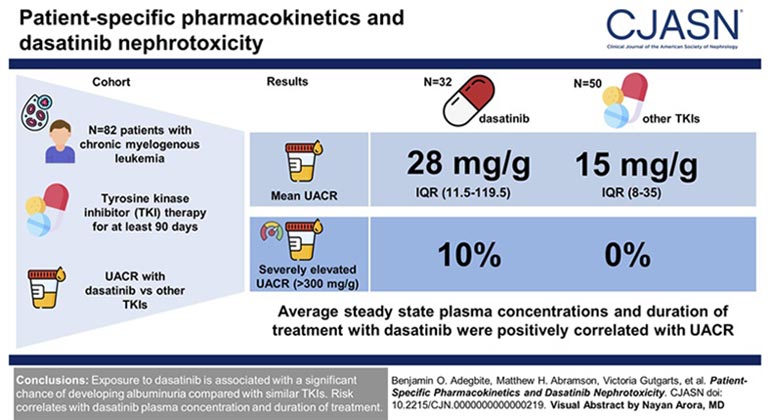Investigators at Mount Sinai Find Strong Association of Kidney Injury with Dasatinib, a Commonly Used Oncological Therapeutic
Findings suggest an update may be warranted for current clinical care, screening guidelines, and FDA guidance on adverse events

Principal Investigator: Evren U. Azeloglu, PhD, Associate Professor of Medicine (Nephrology), Icahn School of Medicine at Mount Sinai
First Author: Benjamin Adegbite, MD, Internal Medicine Resident, Mount Sinai West
Journal: Clinical Journal of the American Society of Nephrology – September Issue
Bottom Line: Investigators found that dasatinib, a drug commonly used to treat chronic myeloid leukemia, is strongly associated with kidney injury.
Why the Study Is Important: The study team strongly believes this study will impact clinical practice significantly, changing standard of care and possibly introducing new black box warnings for dasatinib.
Furthermore, the researchers point out that the incidence of kidney injury is a previously unknown severe side effect for this drug. This side effect, they report, is advertised to be rare; however, they observed it in 10 percent of all participants taking dasatinib. Of concern, they say, is that patients taking dasatinib are currently not screened for kidney injury or dysfunction, making them susceptible to chronic kidney disease.
What the Study Found: Eighty-two participants who have been on long-term tyrosine-kinase inhibitor treatment for chronic myeloid leukemia were part of the study; 32 participants were treated with dasatinib and 50 were treated with other, similar drugs. Significantly elevated levels of kidney injury (measured as elevated protein in the urine, or proteinuria) were identified in dasatinib patients, with 10 percent of participants exhibiting severe levels that were later seen to decrease upon cessation of dasatanib use. No participant in the non-dasatinib cohort showed severe proteinuria. Widespread kidney damage in dasatinib patients was also confirmed by kidney biopsy.
How the Study Was Conducted: With the help of Dr. Adegbite and researchers at Memorial Sloan Kettering Cancer Center, the lead investigator, Dr. Azeloglu, led a multi-center clinical study to determine the incidence of kidney injury in patients taking dasatinib. The investigators examined glomerular injury through urine albumin-creatinine ratio (UACR) in 82 patients with chronic myelogenous leukemia who have been continuously taking a tyrosine-kinase inhibitor for at least 90 days. They compared mean differences in UACR, in addition to studying proteinuria. In addition to other blood tests, they also described a case study of a patient who experienced nephrotic-range proteinuria while on dasatinib.
What These Findings Mean: Based on these findings, oncologists prescribing dasatinib may be advised to monitor patients for kidney function or proteinuria and engage a nephrologist to assist in their care. It is also likely that the presence of proteinuria in this setting may result in changes in therapy, especially if proteinuria is severe. Furthermore, the researchers say that these findings suggest that current clinical care, screening guidelines, and Food and Drug Administration guidance on adverse events may need to be updated.
WHAT’S NEXT: Earlier clinical trials reported proteinuria in only less than 1 percent of patients. This may be due to the shorter windows associated with clinical trials versus the lengthier time frame afforded by Dr. Azeloglu’s retrospective study. Larger prospective clinical studies can help identify which patients are susceptible to this type of injury and design alternative treatment strategies.
Funding: This work was supported by National Institutes of Diabetes and Digestive and Kidney Diseases (R01 DK118222).
Quotes: “Ten percent of patients in our study exhibited severe levels of kidney injury, which is striking. Earlier clinical trials reported proteinuria, or high levels of protein in the urine, in less than one percent of patients only, which may be due to their shorter follow-up. Larger prospective clinical studies can help us identify which patients are susceptible to this type of injury and design alternative treatment strategies,” says Principal Investigator Evren U. Azeloglu, PhD, Associate Professor of Medicine (Nephrology), Icahn School of Medicine at Mount Sinai.
“We think our study will impact clinical practice significantly, changing standard of care and possibly introducing new black box warnings for the drug that is being studied,” says Dr. Azeloglu.
About the Mount Sinai Health System
Mount Sinai Health System is one of the largest academic medical systems in the New York metro area, employing 48,000 people across its hospitals and more than 400 outpatient practices, as well as more than 600 research and clinical labs, a school of nursing, and a leading school of medicine and graduate education. Mount Sinai advances health for all people, everywhere, by taking on the most complex health care challenges of our time—discovering and applying new scientific learning and knowledge; developing safer, more effective treatments; educating the next generation of medical leaders and innovators; and supporting local communities by delivering high-quality care to all who need it.
Through the integration of its hospitals, labs, and schools, Mount Sinai offers comprehensive health care solutions from birth through geriatrics, leveraging innovative approaches such as artificial intelligence and informatics while keeping patients’ medical and emotional needs at the center of all treatment. The Health System includes approximately 9,000 primary and specialty care physicians and 11 free-standing joint-venture centers throughout the five boroughs of New York City, Westchester, Long Island, and Florida. Hospitals within the System are consistently ranked by Newsweek’s® “The World’s Best Smart Hospitals, Best in State Hospitals, World Best Hospitals and Best Specialty Hospitals” and by U.S. News & World Report's® “Best Hospitals” and “Best Children’s Hospitals.” The Mount Sinai Hospital is on the U.S. News & World Report® “Best Hospitals” Honor Roll for 2024-2025.
For more information, visit https://www.mountsinai.org or find Mount Sinai on Facebook, Twitter and YouTube.